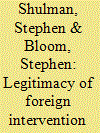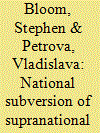| Srl | Item |
| 1 |
ID:
117046


|
|
|
|
|
| Publication |
2012.
|
| Summary/Abstract |
The empirical and theoretical study of the effect of foreign intervention in the electoral processes of states is exceedingly weak. Using insights from the nationalism literature, this article provides a theoretical argument on domestic reactions to foreign interference in a state's internal politics. It then tests the predictions generated by the argument using mass survey data in Ukraine. The article analyses the Ukrainian people's reaction to Western and Russian intervention in the 2004 presidential elections - the Orange Revolution. We find that efforts by Western governments, international organisations, and non-governmental organisations to shape Ukraine's electoral landscape appear to be unwelcome to average Ukrainians while electoral interference by a non-democratic state, Russia, is seen as less alienating. Our theoretical framework accounts for these potentially surprising results.
|
|
|
|
|
|
|
|
|
|
|
|
|
|
|
|
| 2 |
ID:
124325


|
|
|
|
|
| Publication |
2013.
|
| Summary/Abstract |
The structural funds were designed to give the European Commission supranational control over where regional aid was spent. In this article, we argue that domestic 'pork-barrel' politics determine which regions are awarded regional aid in the new member states of Eastern Europe. Support for our argument comes from a dataset that includes 1,688 European Regional Development Fund grants to Latvia's 118 regions and 1,533 pre-accession Phare awards to Bulgaria's 264 municipalities. In both Bulgaria and Latvia, we find that regional aid projects went to wealthier not poorer localities, and to those that supported coalition parties in the previous election.
|
|
|
|
|
|
|
|
|
|
|
|
|
|
|
|
| 3 |
ID:
084710


|
|
|
|
|
| Publication |
2008.
|
| Summary/Abstract |
This article tests fiscal appeasement, needs-based and coalition potential hypotheses for redistribution in post-Soviet Latvia and Ukraine. I argue that the government's decision to reward a minority population depends on the coalition potential of minority parties and voters. In Latvia, the non-participation of minority parties in governing coalitions means that the distribution of spoils among coalition partners does not benefit the regions in which Russian speakers live. In Ukraine, on the other hand, voters and parties in western Ukraine have been sought out by Russian-speaking politicians from eastern Ukraine, and the districts of western Ukraine received preferential treatment as a result.
|
|
|
|
|
|
|
|
|
|
|
|
|
|
|
|